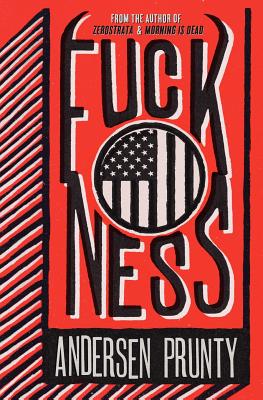I followed through on my own project! And read my book for The Casual-Ass Internet Book Club! Even if I’m probably the only one!

Unfortunately, when I sit down to write or even talk about something I’ve read, I usually just go “THE SENTENCES AND HOW THEY MADE WORDS?! BUT ALSO IT WAS NOT LIKE… EXPECTATIONS?!?!”

The protagonist in Fuckness is sixteen at the time of the events of the book and, theoretically, twenty-six in his narration of the events. He describes himself as ugly and stupid, but despite that manages to see himself as more aware than the “blobs” that surround him. I knew from the inception of the philosophical talk of “fuckness” and his insistence that people working within social constructs were mindless that I wasn’t going to like Wallace Black. I was that kid at 13-14 and I didn’t even like myself then. I also know that the kind of kid who is in the throes of being that kid would probably love him. And that’s okay! We’re all angry youths at some point.
“Every fucking day. How could anybody do anything every fucking day of his life.”
Regardless of my dislike, I was in it with this kid. And that’s a sign of a decent writer, that even when you know someone is being a shitty person and making their life harder than it needs to be, you can sympathize with the hurt and cruelty thrown at them.
It’s not that Wallace doesn’t deserve some of the shit he gets — despite Wallace’s examination of it, it’s honestly hard to tell whether Prunty knows that Wallace’s sexual assault of his classmate is sexual assault or not and whether or not he thinks he deserves at least some sort of punishment for it (because he does) — it’s that he’s a sixteen year old eighth grader who gets his ass handed to him by an age-appropriate eighth grader, gets no sympathy or concern from his teacher, and has to go home knowing he’s probably going to be severely punished for getting his ass handed to him. He’s poor, he’s ugly, he’s stupid, he’s disenfranchised, and as the story goes on you come to understand his suffering. You never really like or understand Wallace, but you at least comprehend how much he believes he suffers.
“I didn’t see how anyone could brutalize someone whose shoes had fallen off.”
My biggest issue with Fuckness is that I expected it to be a hell of a lot weirder than it was.
This darkly offbeat novel opens with the narrator, Wallace Black, as the target of the school bully’s violence. After suffering a horrendous beating, Black goes home to his equally abusive family. As a punishment for fighting at school, his mother straps a set of grotesque horns to the top of his head. He is unsure of where the horns came from. They have always been in the house. And they contain a power no one could have expected.
That sounds like a Very Weird book. Giant grotesque horns as punishment! Giant grotesque horns of seemingly mysterious origin! Giant grotesque horns with power!
But, in action, the horns are only a little magical — they attach themselves to Wallace’s scalp as though they were organic to him — and their power seems only to be to allow Wallace to unleash the violence that rages quietly inside of him. Giant grotesque magical horns of power and mysterious origin? Awesome. Big horns that have always been in the Black family and seem only to unlock Wallace’s own fury? Boring as hell.
“Sometimes I feel like I’m only living to die.”
Fuckness reads like the NaNoWriMo project I wrote in 2005 when I was 20 and angry and obsessed with Chuck Palahniuk. When I thought violence was the key to good stories and the grosser and more gore-filled the violence the better. It turns out that’s super, really, often not the case (though it can be!) and also, reading it is exhausting and unfulfilling.
Had Wallace’s rage seemed more justified or if his victims had been more “deserving” — Prunty really seems to struggle with what is supposed to be abuse and what is supposed to be punishment and what Wallace feels about all of it (He sometimes feels he deserves punishments, but they seem to be the ones which he doesn’t actually deserve.) — or even if Wallace’s experiences and actions felt more purposeful and resonant — his time in the Tar District feels almost as though it’s over in a blink when he spent so much time getting there and talking about how important it would be — maybe I’d feel like I’d gotten something out of it even without it being as weird as I’d hoped.
Wallace doesn’t grow or change or learn. He wanders and he inflicts some juvenile sense of “justice” on the world that’s done him wrong, but in the end he’s dead and, I guess, comfortable with it?
“You can never really hide poor. Like blood, it courses through the veins.”
The other big issue is, Fuckness is trying pretty hard to say something about poverty and what it can do to the people who live in it, about low-income neighborhoods and what they suffer at the hands of the wealthy, what happens to kids like Wallace when they’re invisible. It’s trying really hard to get there and in the end of the book Wallace even says, “I’ve been able to think about my philosophy of fuckness, structuring it into a politics of poverty.” but we never see that. His explanation of fuckness never goes beyond a guy who wears a tie every day without questioning it. The threads of this grander idea are there and it’s a fucking bummer that Prunty never really ties them up.
“If you ever want to know the true nature of your soul, you’ll live in complete and total poverty. Poverty makes people do things that maybe they didn’t think were possible.”
I like that Wallace likes skipping. I like that he thinks teeth can make or break a person. I like that there’s a sense that, had he the opportunity, he might’ve grown up to really figure some shit out. I liked “You know someone is mad when they cease caring about the retention of their bodily fluids.” I like that Wallace questions his own beliefs and thinks about the consequences of how we see other people.
“… when it’s all said and done, we are really living to live.”
Wallace Black has a lot of potential, but Prunty refuses to let it develop and that’s the biggest disappointment of all.
1: Where “competent” means “is capable of stringing words together in a way that is generally coherent”.
2. Though not nearly as much as I wish I did.
3. Eloquent, eh?



